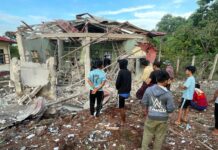By Kantarawaddy Times
Since January, residents and internally displaced persons (IDPs) in the western part of Dee Maw Hso Township, Karenni State have been experiencing water shortages, forcing them to conserve water, according to local sources.
Most of the IDP camps are located in water-scarce areas, relying heavily on donations from charitable organizations. However, existing streams, creeks, and natural water sources have been drying up, exacerbating the drinking water crisis.
“We have to buy water, and it’s expensive. IDPs have no choice but to purchase water, and now it’s becoming scarce. Some reservoirs have already dried up. When the summer comes, there will be even more restrictions on water use. Even in western Dee Maw Hso o and places like Pasae Lar, water scarcity is a big problem. People have to buy and ration water, sometimes running out within three weeks,” said a male resident from western Dee Maw Hso.
A 1,000-gallon water truck costs over 60,000 Kyats, which a family of five can use for a little over 20 days. The primary uses of this water are for cooking and drinking, while activities like laundry, bathing, and personal hygiene are significantly reduced due to the shortage.
Many of the affected IDP camps have demanded urgent support from the Interim Executive Council (IEC) of Karenni State. According to U Bayan, the Deputy Secretary (2) of the IEC, the council is currently distributing water to 60 IDP camps, serving approximately 150,000 displaced people. He stated that providing adequate water supply costs around 10 million Kyats per month.
“We cannot provide water to all 150,000 people. Water is already scarce, and even what we have needs to be rationed. In some areas, people have to walk for hours just to fetch water. Some families can afford to buy water, while others rely on donations and share what they receive,” U Bayan explained.
Every dry season, multiple townships, including Dee Maw Hso, face worsening water shortages, prompting calls for long-term solutions. In Dee Maw Sho Township, which has the highest number of IDPs, they struggle not only with food shortages but also with securing access to clean water.




